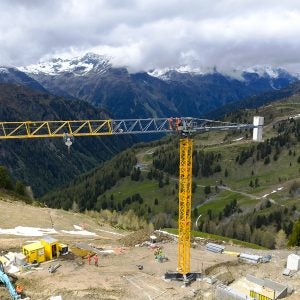The ONS uses 2000 prices as a baseline. Overall, the value of new housing jobs in the second quarter of 2008 fell £525m from the same period in 2007, a drop of 14.8%. The bulk of the change was in new private housing developments, which dropped 16.6% to £2.39bn from £2.86bn, a £475m fall.
In recent years, a large part of the UK residential housing construction market has been driven by apartment development, funded ultimately by individual investors taking out ‘buy-to-let’ mortgages. The more cautious approach taken by banks in recent months may have affected this investment.
Industrial construction also fell steeply, although this has been a smaller part of the overall UK construction market than residential construction for many years. In the second quarter of 2006, industrial construction output stood at £1bn; this year, it fell £215m (21%) to £810m.
These drops were made up elsewhere in the construction sector, however. Infrastructure output was up 21%, or £266m, to £1.52bn, and non-residential public sector construction output rose £245m to £1.87bn, a 15.1% rise. Commercial construction was up too, albeit more slowly, by 2.8%, to £4.16bn. In all, these sectors kept total output from new work steady, at £11.38bn, a change on the same quarter of last year of a single percentage point.
A 6.2% increase in output in the repairs and maintenance sector pushed overall construction output up £442m, or 2.1%, to £21bn. The biggest contribution to this growth came from the private housing sector, where output rose £228m (7.5%) to £3.25bn. In percentage terms, repairs in the public housing sector grew even more sharply, up 11.1%, or £171m, to £1.71m. Overall, construction output from repairs and maintenance, was up £558m.
Construction Products Association chief executive Michael Ankers said, “These figures confirm the serious state of the new housing market and the slowdown that many companies are experiencing in private sector industrial and commercial work. The strength of the repair and maintenance market is surprising, but has been helped by the funding for energy efficiency improvements through the new Carbon Emissions Reduction Target scheme which became operational at the beginning of April [and commits energy suppliers to invest in efficiency improvements]. There are also some indications that with the sharp fall off in house sales people who have decided not to move are spending more on their existing property.
“These figures also demonstrate the importance to the construction industry of government remaining committed to the capital spending plans set out in last year’s Comprehensive Spending Review [a three year government budget]. Without the planned increase in spending on infrastructure, schools, hospitals and improvements to social housing, the construction industry would already be in recession, which would have serious consequences for the broader economy.”






